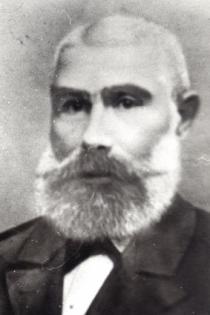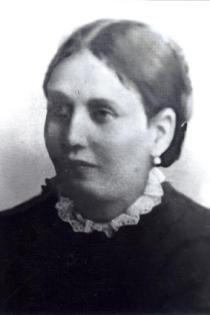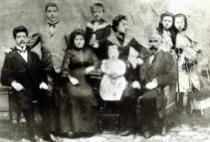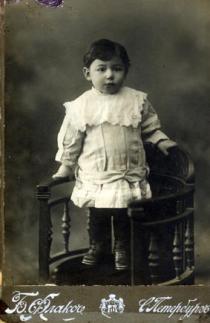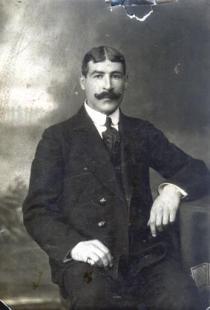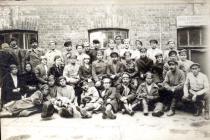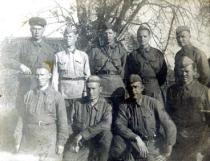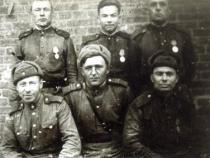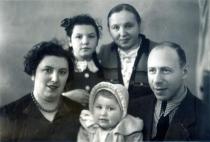This photograph was taken in St. Petersburg in 1913 on the occasion of my birthday. My mother liked it very much. She used to show it to me and say ‘Look here: this is what you looked like when you were 1 year old.’
I was born in St. Petersburg in 1912. It happened in the apartment near Fontanka River. Later when our family became larger, we moved to another apartment, situated nearby, in Voznessensky prospect. Till now I like to come there, to stand in the street and recollect my childhood and youth. We lived on the 3rd floor of the big stone building. It was surrounded by lots of trees. The pavement was made of wooden blocks. During the flood of 1924 all pavements went up and moved together. It was very terrible.
Several times I watched our tsar Nikolas II passing by along our street to the Winter Palace. [Winter Palace was built by the architect B. Rastrelli as a residence for Russian tsars; nowadays it is one of the buildings occupied by the State Hermitage museum.] All passers-by stopped, men took of their headwear and shouted welcoming the tsar.
In my early childhood all transport was animal-drawn. In the streets there were carts, carriages, etc. In the Alexandrovsky market situated not far from our house, there was a special place where they sold everything necessary for horses and carts. When a child I liked to go there very much: all those things seemed to me an embodiment of beauty. Many people from the neighboring villages came there to buy goods. I always went to school through that market. I saw there many different things. I liked to lounge about the open second-hand goods market (they called it a flea market).
In Petersburg there lived many Jews. Our house was situated next door to the synagogue, and I often observed crowds of people which the synagogue hall could not seat.
It was a pleasure to watch the way Jews communicated with each other in the yard of the synagogue: endless conversations, atmosphere of total amiability and togetherness. All that impressed me greatly.
I guess that before the Revolution in Petersburg there were many synagogues and meeting-houses. I can judge from a meeting-house situated five minute's walk away from the synagogue. But soon after the Revolution their number began to decrease promptly. There were also mikves, shochetim, and everything other necessary.
There were no special Jewish places of residence, Jews lived all over the city, but for some reason they often appeared to live within call. For example, in our house there lived several Jewish families.
There were no special occupations typical for Jews. Among them there were many tradesmen, but a lot of doctors and lawyers, too. And my uncle was a worker, a founder.
In the city there was electricity and water supply, but stove heating. People kept fire wood in special sheds near their houses.
I remember that my father went to synagogue. He took his children with him. I studied in cheder at that synagogue. I think that my father wanted to teach us. But Revolution came and (though during the first years under Soviet power there was no state anti-Semitism) they started struggling against religion. The synagogue was closed, cheder too. It happened approximately in 1920. And before that we celebrated all holidays in the synagogue, built sukkah in its court yard. My grandmother told us many-many times (until her death) how to celebrate holidays correctly. Till now I remember challot for Sabbath.
I have a hazy recollection of the Revolution of 1917. Our street witnessed interminable demonstrations. My basic memoir is big noise, shouts, singing out of tune. In 1924 I became a pioneer. I idolized Lenin. When he died, I sobbed violently several days without a break. My adoration was akin to unction. I was a permanent participant of demonstrations on May Day and during October holidays. It was very cheerful! We sang much. It is strange that I have forgotten all revolutionary songs of that time. I do not remember any manifestations of anti-Semitism. I still think that the main anti-Semites are not people who persecute Jews, but those Jews who betray their Jewish nature, changing their surnames and names to more harmonious in local style.
We did not go to the market: there was no need. All shops were situated near to our house. And I went to market for entertainment.
Political events did not concern us. But possibly parents did not want to discuss it with their children. As for me, I sincerely consider our country (the USSR) to be the best one in the world, I thought that I was extremely lucky to be born here.

